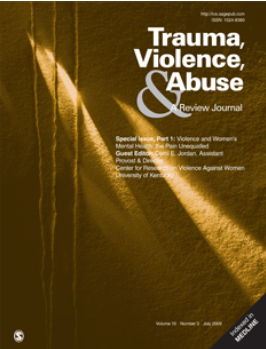亲密伴侣施暴者累犯的心理预测因素:系统性范围审查
IF 5.4
1区 社会学
Q1 CRIMINOLOGY & PENOLOGY
引用次数: 0
摘要
关于亲密伴侣暴力(IPV)惯犯的理论阐述,在心理风险因素的相对权重方面仍然存在很大差异。目前还缺乏对已确定再犯罪心理预测因素的研究的系统性概述。本研究旨在确定并概述与 IPV 施暴模式相关的各种心理因素的研究。我们在 PsycINFO、PubMed 和 PILOTS 上对 1945 年至 2024 年期间进行的研究进行了系统检索。纳入标准为:研究不得仅使用自我报告的再犯罪数据,必须使用刑事司法样本,必须是纵向研究,参与者年龄必须超过 17 岁,研究必须以英语发表并经过同行评审。共有 25 项纵向研究符合条件,这些研究对个人心理因素进行了调查,并提出这些因素可能是 IPV 重犯的预测因素。已确定的因素分为五类:个性、愤怒和敌意、信念、态度和动机、神经认知缺陷和创伤(即原生家庭虐待/创伤后应激障碍)。目前的系统性范围审查发现,对 IPV 再犯的心理预测因素研究最多的是人格。虽然关于最有可能导致再次犯罪的人格特质或人格障碍的研究各不相同,但总体而言,人格评估似乎是预测再次犯罪的一种有前途的工具。愤怒、童年虐待、创伤后应激障碍(PTSD)、隐性态度和神经认知缺陷也被认为是 IPV 再犯的预测因素。各项研究均发现存在方法问题。本文章由计算机程序翻译,如有差异,请以英文原文为准。
Psychological Predictors of Recidivism for Intimate Partner Violence Perpetrators: A Systematic Scoping Review
Theoretical accounts of recidivistic intimate partner violence (IPV) continue to differ considerably in relation to the relative weight given to psychological risk factors. A systematic overview of studies that have established psychological predictors of reoffending is currently lacking. This study aimed to identify and provide an overview of studies examining various psychological factors associated with IPV perpetration patterns. A systematic search of research conducted from 1945 to 2024 was carried out on PsycINFO, PubMed, and PILOTS. The inclusion criteria were that studies must not use self-reported reoffending data only, must use a criminal justice sample, must be longitudinal, participants must be over 17 years of age, and that studies must be published in the English language and peer reviewed. A total of 25 longitudinal studies examining individual psychological factors, proposed as potential predictors of IPV reoffending, were eligible. The identified factors were grouped into five categories: personality, anger and hostility, beliefs, attitudes and motivation, neurocognitive deficits and trauma (i.e., family of origin abuse/post-traumatic stress disorder). The current systematic scoping review found that the most-researched psychological predictor of IPV recidivism was personality. While studies vary in relation to the personality traits or disorders that contribute most to the likelihood of reoffending, in general, personality assessment appears to be a promising tool in predicting reoffending. Anger, childhood maltreatment, post-traumatic stress disorder (PTSD), implicit attitudes, and neurocognitive deficits were also identified as predictors of IPV recidivism. Methodological issues were found to be present across studies.
求助全文
通过发布文献求助,成功后即可免费获取论文全文。
去求助
来源期刊

Trauma Violence & Abuse
Multiple-
CiteScore
13.60
自引率
7.80%
发文量
131
期刊介绍:
Trauma, Violence, & Abuse is devoted to organizing, synthesizing, and expanding knowledge on all force of trauma, abuse, and violence. This peer-reviewed journal is practitioner oriented and will publish only reviews of research, conceptual or theoretical articles, and law review articles. Trauma, Violence, & Abuse is dedicated to professionals and advanced students in clinical training who work with any form of trauma, abuse, and violence. It is intended to compile knowledge that clearly affects practice, policy, and research.
 求助内容:
求助内容: 应助结果提醒方式:
应助结果提醒方式:


